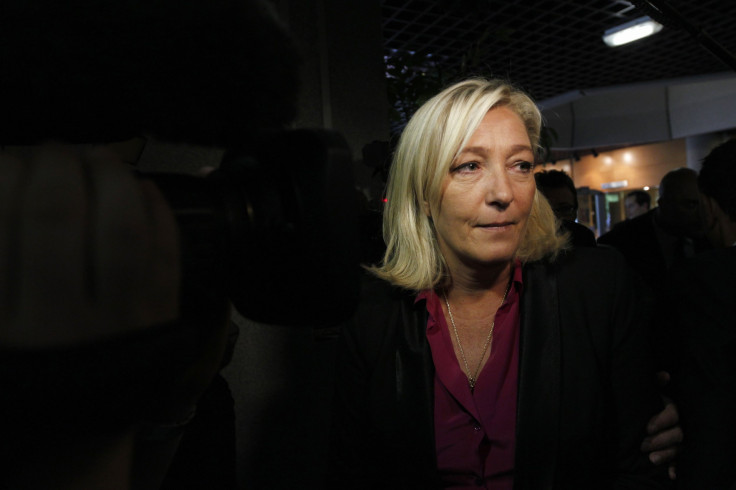Did Russia Try To Bribe French Politicians? Leaked Texts Suggest France's Right-Wing Party Endorsed Crimean Referendum For Cash

Text messages revealing a potential bribe paid by Russia to France's Front National party in exchange for an endorsement of last year's controversial Crimean referendum were released by a Russian hacker group this week. The texts reveal Russian plans to “thank” the nationalist party “in some way or another” for the endorsement of the referendum. Nine months later, a Russian-owned bank gave Marine Le Pen, the leader of the nationalist party, a 9 million-euro loan.
Anonymous International published this week a trove of texts between Timur Prokopenko, a Kremlin internal affairs official, and a man known as Kostia, who was in direct contact with Front National. Their publication followed tens of thousands of Prokopenko's texts leaked by the group in February. The messages have not been verified, but a Russian journalist confirmed in February that texts between himself and Prokopenko leaked by the hacker group were genuine.
The far-right Front National party has long expressed its admiration for Russian President Vladimir Putin, but there has never been any confirmed evidence that Le Pen's endorsement of the Crimean referendum last March was negotiated with Russian officials. Le Pen strongly denies any such arrangement to endorse the referendum.
On March 11, Prokopenko told a man with links to Front National, identified as Kostia, that “we really need [Le Pen to support the Crimean referendum], I said to the boss you could arrange this with her,” to which Kostia responded that Le Pen “will officially take a position on Crimea,” according to Newsweek. The two then discussed “funding” of some sort involving an unidentified Russian deputy foreign minister, although it is unclear what the funding concerns. The texts do not explicitly say that Le Pen or Front National would be compensated for supporting the referendum.
Front National sent a representative to observe the referendum in a bid to legitimize what Western leaders called an illegitimate and illegal vote. La Pen publicly expressed support for the referendum a day after it was held. Upon hearing the news, Prokopenko texted “she has not betrayed our expectations” to Kostia, who replied, “We must, in one way or another, thank the French. It is important.” Prokopenko agreed.
The Front National, which does not enjoy widespread support in France, has made headlines since its 1972 founding for its often fiery stances on immigration and French identity. Le Pen expressed her support for Russia throughout the Ukrainian crisis in interviews and speeches, attracting criticism from European leaders who condemned alleged Russian action in Ukraine.
Anonymous International released around 40,000 of Prokopenko’s texts this year, revealing conversations with top Russian officials, including the Kremlin’s top media official, Maxim Ksenzov, about how to handle anti-corruption journalism by opposition critics. Ksenzov at one point wanted to block the BBC in Russia over a story involving federalist activists in Siberia, but Prokopenko talked him down, according to Meduza.
Little is known about the people behind Anonymous International, which calls itself Shaltai Boltai, or Humpty Dumpty, but the documents of top Russian officials it has managed to leak have caused a stir in Russia. Meduza interviewed some people involved with the group in a feature piece detailing its exploits.
© Copyright IBTimes 2024. All rights reserved.












